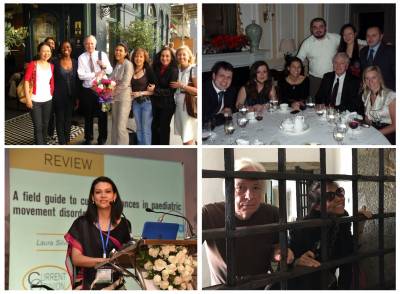Can you tell me something about your life in Brazil?
I was born and raised in Campinas, a large but strangely provincial city in Southern Brazil. I have five younger siblings and more than 25 cousins. My love for people of all walks of life has shaped my decisions, including my career choices.
Why did you decide to study medicine at University?
My dad is a very happy doctor and I grew up dreaming of a life like his. He is now 75 years old and except for martial arts and spending time with grandchildren, there is nothing he likes more than his private practice.
Why did you decide to come to Queen Square?
My pursuit of excellence and tireless quest for knowledge brought me to Queen Square. I had already taken the USMLEs during my Neurology residency at a premier Brazilian hospital (University of São Paulo). I was in the US pursuing opportunities for further training when I was considered for a Clinical Research Fellow post in Queen Square. I remember all my North American colleagues were super excited about it. Apparently Queen Square has been the place to be for the last 150 years!
What are your memories of the time you spent at Queen Square?
Every day was intellectually stimulating and the camaraderie of the staff and students unparalleled. I am an anxious person and like many people I tend to feel incredibly stupid when facing a lot of new challenges and being surrounded by exceptionally clever peers. But in Queen Square, people were so astonishingly kind and generous, and I never felt judged. And most of all, it was a lot of fun. I think the people who were around the Square at the same time as me know what I am talking about.
I know you are passionate about education, what for you makes a great educator?
Of course there are many different ways to teach. I personally think logical capacity to analyse and synthesize knowledge allied with modesty and compassion build great teachers. I was fortunate to have three such mentors: Prof Ronald Ranvaud, Prof Egberto Barbosa and Prof Andrew Lees. I try my best to emulate them.
What do you think are the challenges of being a woman working in the field of Neurology?
I can only speak for myself. I think there is still a lot of prejudice, but in my case I believe my own insecurities were my main obstacle. It is hard to feel secure when you too often see women holding the short end of the stick. Every time we are fair to one woman we are being fair to all the women who come after her.
What are you working on now?
I have two incredibly demanding and evolving projects right now. I have taken the role of coordinating the Movement Disorders Service at the second largest Brazilian university (University of Campinas) and I am starting a Neurology service at the largest mental health complex in Brazil (Fundação Espírita Américo Bairral, in Itapira), which includes a hospital with over 800 psychiatric beds. I am also following my dad’s footsteps and working on building my private practice. I do not think I will get to the martial arts bit, though!

Upper left: 2009 celebrating passing my PhD viva at UCL. Upper right: 2011 Christmas dinner with our team including two of my Queen Square students. Lower left: 2016 at the National Meeting for Sri Lankan Neurologists talking about my work with paediatric movement disorders in Brazil. Lower right: 2018 playing outlaws with Prof Andrew Lees during his visit to the old town of Ouro Preto in Brazil for the National Movement Disorders Meeting.
 Close
Close

